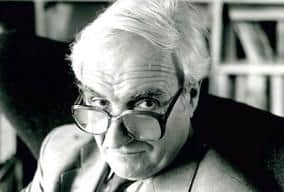Scotsman Obituaries: Sir David Butler, father of modern election science
Known as the father of modern election science, David Butler once dismissed the term psephologist as “an awful, silly, academic joke” that hung round his neck like an albatross. It had been coined by another scientist and came from the Greek word “psephos” meaning pebble, denoting the way Athens citizens voted using coloured pebbles. After Butler used it in a book he was overwhelmed by journalists asking about the new word.
And it was what made him known as the foremost election analyst for decades, a staple of the BBC’s election night coverage for almost 30 years, pioneer of swing theory and co-inventor of its famous Swingometer.
Advertisement
Hide AdAdvertisement
Hide AdHe promoted the concept of swing on Britain’s first TV election night in 1950 when, aged just 25, he appeared on the BBC as an in-house expert, and had analysed almost every British general election since the Second World War, in which he served as a teenage tank commander.


Butler, born into a family of academics, Oxford dons and writers, was the son of Professor Harold Butler and his wife Margaret. After attending Colet Court and St Paul’s School in London, he read philosophy, politics and economics at New College, Oxford. His studies were soon interrupted by war and he was commissioned as a lieutenant in the Staffordshire Yeomanry. Still aged just 19, he led a dangerous tank crossing of the Rhine in the latter days of the conflict.
Back home he rediscovered and adapted the Cube Rule, an equation previously devised by an MP and amateur statistician, to try to explain the relationship between the number of votes and seats. He translated it to three general election results and found it worked surprisingly well in estimating the total number of seats won for the share of the vote polled. It enabled him to forecast the seats likely to be won by two major parties on the basis of the latest opinion polls.
While still an undergraduate, Butler set out the Cube Rule for elections and published it in a statistical appendix he wrote for the first Nuffield election study in 1947. Completing his degree at Oxford, he won a Scholarship at Princeton University, New Jersey, and did post-graduate research into opinion polls.
After Princeton, he spent the last six months of 1948 hitchhiking around the USA during the presidential election, following candidates including Harry Truman. He also dabbled in journalism, writing initially as a foreign correspondent for the political and literary review magazine Time and Tide.
On his return to Britain he enrolled at Oxford University’s Nuffield College, writing his Doctor of Philosophy thesis on the Evolution and Working the British Electoral System, 1918-1950, which was published by the university press in 1953.
Having already contributed to the Nuffield election studies, he agreed to take over the series and when the snap election of 1951 was announced he was appointed a junior research fellow at Nuffield. The following year the first of his 43 books was published, some of which have gone through multiple editions, with British Political Facts, now titled Butler’s Political Facts, in its 11th edition. The young Butler also came to the attention of Winston Churchill, who summoned him to his home to discuss his work and give polling advice.
Alongside his academic career, he found a role in broadcasting, presenting various programmes and helping to design the Swingometer. In 1958 he hosted a conference for the BBC, ITV and senior figures of all parties, which resulted in election campaigns being covered on television before the country went to the polls.
Advertisement
Hide AdAdvertisement
Hide AdAt Nuffield, he served as dean and senior tutor from 1956-64 and as bursar from 1976-77. As a member of its Premises Committee he was involved in commissioning everything from the college’s architecture to its art.
In the 1960s he collaborated with Michigan-based political scientist Donald Stokes, producing the work Political Change in Britain: Forces Shaping Electoral Choice, based on thousands of interviews with voters, which was the precursor to the British Election Study which continues today.
And in 1962 he married Marilyn Evans, who became King Edward VII Professor of English Literature at Cambridge University and rector of Exeter College, Oxford, with whom he had three sons. While her star rose, his waned somewhat when he was passed over for a professorship and let go from the BBC’s election coverage in 1979.
But he remained enormously productive and was an adviser on election broadcasting in Australia in the 1970s and in India the following decade. In 1982 he co-founded the journal Electoral Studies, serving as editor for its first ten years.
Awarded the CBE in 1991, he retired as a Fellow of Nuffield in 1992, remaining an Emeritus Fellow until his death, and was knighted in the 2011 New Year’s Honours List.
Latterly he flirted with Twitter, saying it was wonderful to rediscover one was never too old to learn, and tweeting: “Learning to tweet at 92 has been fun. But my musings should now be confined to elections, so I am signing off… until next year?”
Predeceased by his wife and son Gareth, he is survived by their other two sons Daniel and Edmund.
Obituaries
If you would like to submit an obituary (800-1000 words preferred, with jpeg image), or have a suggestion for a subject, contact [email protected]
Subscribe
Subscribe at www.scotsman.com/subscriptions